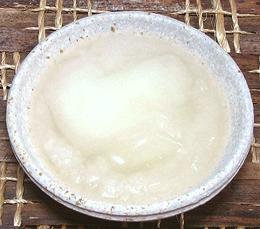 [Cocos nucifera]
[Cocos nucifera]
Coconut oil is either the most deadly oil you can consume, or the most healthy cooking oil on earth - depending on which panel of "experts" you chose to believe. Demographics favor "healthy". It is the most used cooking oil in southeast India, Malaysia, Indonesia and the Philippines - not regions noted for high incidence of congestive heart disease.
Coconut oil is 91% saturated fats and only 3% polyunsaturated fats. It is highly resistant to rancidity, so can be stored at room temperature for long periods of time, and is a preferred ingredient for many products that will be stored at room temperature. Of course, with all that saturated fat it's pretty stiff, with a melting point of 76°F/24.4°C. The specimen in the photo above was at 75.5°F, so was very soft.
Coconut oil has an extremely low oxidation factor so it is highly durable as a frying oil, even more durable than beef tallow. Virgin oil has to be kept below 350°F/175°C, but RBD (refined) oil can go as high as 450°F/232°C.
More on Oils - and -
More on Coconuts.
|
Northern Indians despise the coconut oil used in the south as "smelly" (it smells like coconuts), but the oil commonly available in North America is thoroughly deodorized, with almost no coconut odor. My tests (RBD oil) show it to be a fine medium high temperature frying oil, clear and devoid of any flavor that would interfere with the taste of the food being fried. Types of Coconut Oil:Three types of coconut oil are marketed: "RBD" (Refined, Bleached and Deodorized), "Virgin", and Hydrogenated. The term "extra virgin" has no meaning in regard to coconut oil.
Buying & Storage:RBD coconut oil is available in markets that serve practically any tropical community. It is also stocked by Trader Joe's, Whole Foods and other specialty chains. Virgin oil can be found in natural food stores or on the Internet. Coconut oil is extremely stable and can be stored in a tightly closed jar at room temperature for up to two years.Cooking:Virgin coconut oil needs to be kept below below 350°F/175°C. This places its smoke point quite a bit higher than butter, a bit higher than virgin olive oil and a bit lower than clarified butter. RBD oil can go as high as 450°F/232°C, about the same as corn oil and a little less than olive pomace oil.Substitute:For applications where a liquid oil is appropriate, Pure Olive Oil (not virgin) is a good substitute. It has a good health profile and similarly neutral flavor. For applications requiring a solid fat, lard is the best substitute.Health & Nutrition:Depending on your preferred panel of experts, coconut oil is either more deadly than "heart killing" pig fat, or the most healthy cooking oil on earth. It is 91% saturated fat (pig fat is just 43% while butter is 65%). Saturated fats are supposed to clog your arteries with "bad" cholesterol.In the 1970s "Tropical Oils" (coconut and palm) were pretty much driven from the North American market by the American Heart Association's claims that it would clog your arteries, bringing on heart disease and an early death. They told us to use trans fats and polyunsaturated oils instead. In recent times, just about everything the AHA has preached over the last 70 years has been shown to be wrong, in some cases dangerously wrong. Their campaigns have been based on incomplete and/or defective studies. Today, "tropical oils" are making a comeback, particularly in view of finding safe replacements for deadly trans fats and (possibly just as deadly) polyunsaturated oils. Some say the discrepancy between medical theory and demographics is because there are "good" and "bad" saturated fats, just as we now have "good" and "bad" cholesterol. Others hold that the whole saturated fat theory is bunk. Pig fat doesn't seem very dangerous either, and the cholesterol theory is also unraveling fast. See our article Oils, Fats & Health for more on this. Today, many consider coconut oil the most healthy oil you can cook with, even healthier than olive oil. Further, the study always referenced to show how evil it is, an animal study, is invalid because it used hydrogenated coconut oil (contains evil Trans Fats). But do check out our Medical Disclaimer page. |